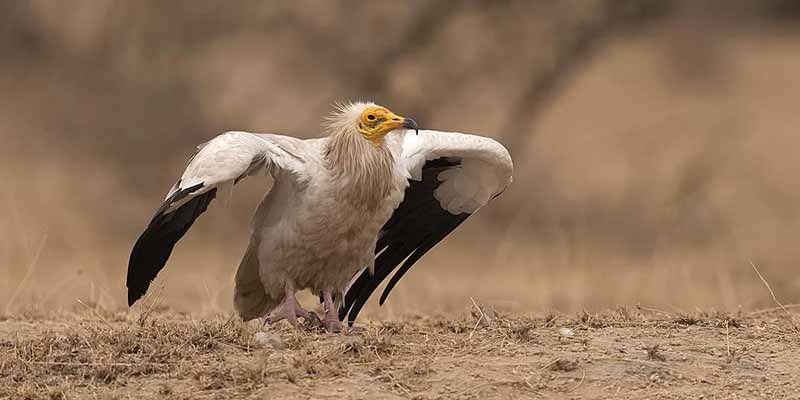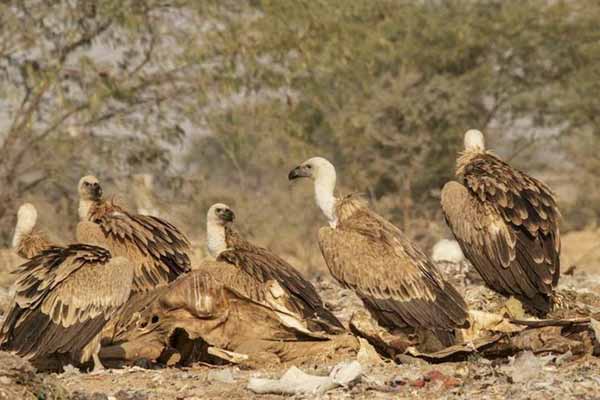Jorbeer Conservation Reserve, located near Bikaner in Rajasthan, India, is a haven for birdwatchers and wildlife enthusiasts. Known primarily for its vast congregation of vultures, Jorbeer serves as a vital scavenging ground for these majestic birds. Species such as the Eurasian Griffon, Himalayan Griffon, Cinereous Vulture, and the endangered White-rumped Vulture can be spotted here in significant numbers, especially during the winter months.
The reserve, essentially a carcass dumping site, attracts vultures and other scavengers like eagles and kites, providing an excellent opportunity for observing these birds in their natural habitat. The stark landscape, dotted with skeletal remains, creates a unique and somewhat surreal environment.
Jorbeer is not just about vultures; it also hosts other avian species like the Steppe Eagle, Imperial Eagle, and various species of falcons. The best time to visit is from November to March when the migratory birds arrive. Jorbeer Conservation Reserve plays a crucial role in the conservation of vultures, which are essential for the ecosystem due to their role in carcass disposal.

History of Jorbeer Conservation Reserve
Jorbeer Conservation Reserve, located near Bikaner in Rajasthan, has an intriguing history that reflects its unique role in wildlife conservation. Originally, Jorbeer was established as a dumping ground for animal carcasses from Bikaner and surrounding areas. The site naturally attracted scavengers, particularly vultures, which found an abundant food supply. Over time, the area became a significant feeding ground for various vulture species, many of which are now critically endangered.
The decline in vulture populations across India due to diclofenac poisoning in livestock carcasses heightened the importance of Jorbeer. Diclofenac, a veterinary drug, proved fatal to vultures, leading to drastic population declines in the late 20th and early 21st centuries. Recognizing the need to protect these essential scavengers, Jorbeer was designated as a conservation reserve. Efforts were made to ensure that carcasses disposed of at Jorbeer were free from harmful chemicals, creating a safer environment for vultures.
Today, Jorbeer Conservation Reserve is renowned for its vulture population, attracting birdwatchers, researchers, and conservationists from around the world. The site plays a critical role in the conservation of vultures and other scavenging birds, highlighting the importance of protecting these often-overlooked species.
Best Time To Visit Jorbeer Conservation Reserve
The best time to visit Jorbeer Conservation Reserve in Bikaner is during the winter months, from November to March. During this period, the weather is pleasant, making it comfortable for outdoor activities. Additionally, these months coincide with the arrival of migratory birds, including various vulture species, which congregate in large numbers at the reserve.
This time of year provides an excellent opportunity for birdwatching enthusiasts to observe a diverse range of vultures and other scavengers such as eagles and kites. Early mornings and late afternoons are particularly favorable for birdwatching, as the birds are most active during these times. The cooler temperatures also enhance the overall experience of exploring the reserve.
Visiting Jorbeer during the winter not only allows for a more enjoyable experience due to the favorable weather but also maximizes the chances of witnessing the spectacular sight of vultures and other birds in their natural habitat.
How to Reach Jorbeer Conservation Reserve
Reaching Jorbeer Conservation Reserve near Bikaner is relatively straightforward due to its proximity to the city. Here are the ways to reach the reserve:
By Air : The nearest airport to Bikaner is the Nal Airport, also known as Bikaner Airport, which is about 15 kilometers from the city center. However, this airport has limited connectivity. The nearest major airport is Jodhpur Airport, approximately 250 kilometers away. From the airport, you can hire a taxi or take a bus to reach Bikaner.
By Train : Bikaner is well-connected by rail to major cities in India. Bikaner Junction and Lalgarh Junction are the two main railway stations in the city. Regular trains run from Delhi, Jaipur, Jodhpur, and other cities. From the railway station, you can hire a taxi or an auto-rickshaw to reach Jorbeer Conservation Reserve, which is about 12 kilometers away.
By Road : Bikaner is accessible by road from major cities in Rajasthan and neighboring states. You can drive to Bikaner or take a bus operated by the Rajasthan State Road Transport Corporation (RSRTC) or private operators. Bikaner is well-connected to cities like Jaipur, Jodhpur, and Delhi via national highways.
Local Transport : Once you reach Bikaner, you can hire a taxi, auto-rickshaw, or even rent a car to reach Jorbeer Conservation Reserve. The reserve is located around 12 kilometers from the city center, making it a short drive.
